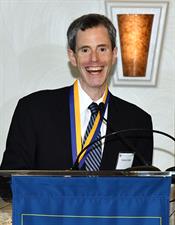STAFF REPORTS
 ROCHESTER, N.Y. — Tristram Smith, Ph.D., whose research on behavioral interventions changed the landscape of care for children with autism spectrum disorders (ASD), died after suffering a heart attack on Monday morning. He was 57.
ROCHESTER, N.Y. — Tristram Smith, Ph.D., whose research on behavioral interventions changed the landscape of care for children with autism spectrum disorders (ASD), died after suffering a heart attack on Monday morning. He was 57.
At the time of his death, Smith was serving as the Haggerty-Friedman Professor in Developmental/Behavioral Pediatric Research at the University of Rochester Medical Center (URMC), where he had worked since joining faculty in 2000.
His research in the late ‘80s and early ‘90s, conducted alongside the late O. Ivar Lovaas, Ph.D., showed that many children with ASD could be successfully treated with behavior-based interventions, which allowed some to catch up to their peers in school. The work helped move treatment of children with ASD away from psychotherapy — which had been used with nominal effectiveness for decades — and toward applied-behavior based models. The sea change in treatment paved the way for ASD screenings in schools and pediatricians’ offices and led to numerous additional studies on behavior-based interventions.
“There’s no overestimating how Tris transformed how we understand and address the needs of children with autism,” said Angela Geiger, president and CEO of Autism Speaks. “His work continues to give new hope to families and improve outcomes and quality of life across the lifespan.”
In the wake of the deluge of clinical studies that followed his early work, Smith examined the comparative effectiveness of the various emerging treatments. A prolific researcher, he published hundreds of papers on ASD, and spent his spare time pushing for policy changes that would allow effective treatments to become available to more patients.
“For autism families, he was a hero,” said Alison Singer, president of the Autism Science Foundation. “His research was groundbreaking, of course, but he also pushed for increased access to autism services and lobbied for legislative changes. It’s unusual to see scientists also act as advocates, but Tris went far beyond what most clinician-researchers do.”
More recently, Smith demonstrated that clinical training programs for parents and caregivers could translate to tremendous behavior gains for the child, which spawned another wave of research, along with national and international efforts to implement clinical programs.
In addition to lauding his research accomplishments, colleagues remembered him as a gentle, compassionate man who shied away from the spotlight, always preferring to showcase his partners and collaborators.
“Perhaps it is a bit old-fashioned to say, but he was the epitome of a dying breed — a true gentleman,” said John Foxe, Ph.D., Chair of the Department of Neuroscience at URMC. “Working shoulder-to-shoulder with him to build the University of Rochester’s clinical research program in autism and other intellectual and developmental disabilities was one of the great honors of my career.”
“He could say in 30 words what would take the rest of us a lifetime,” said Susan Hyman, M.D., Chief of the Division of Developmental and Behavioral Pediatrics at URMC. “He may have been unassuming, but when he spoke, everyone would listen. I can’t begin to tell you what a loss this is for all of us.”
Over his two decades in Rochester, he also became a valued mentor to many younger physicians and scientists in the field.
“Many of us who were early in our careers thought that working with him might be intimidating, but he treated everyone with such respect,” said Suzannah Iadarola, Ph.D., assistant professor of Developmental and Behavioral Pediatrics at URMC. “He honestly believed that he was learning just as much from you as you were learning from him — even though you knew that wasn’t really true. But that’s just how he made everyone feel.”
Smith earned his doctorate in clinical psychology at the University of California, Los Angeles (UCLA). He worked at Washington State University, Drake University, and UCLA prior to his time in Rochester.
He is survived by his wife, Jennifer Katz; children, Jonah Smith and Madeleine Katz; sisters, Lisa Smith Trollbäck and Rebecca Smith Waddell; nieces and nephews. Friends may call Thursday, 4 to 7 p.m. at Anthony Funeral Chapel, 2305 Monroe Ave. In lieu of flowers, contributions may be made to the Autism Science Foundation or the American Civil Liberties Union.
All WNY is made possible thanks to coffee and sleep deprivation.
We appreciate your readership. We like money, too.

